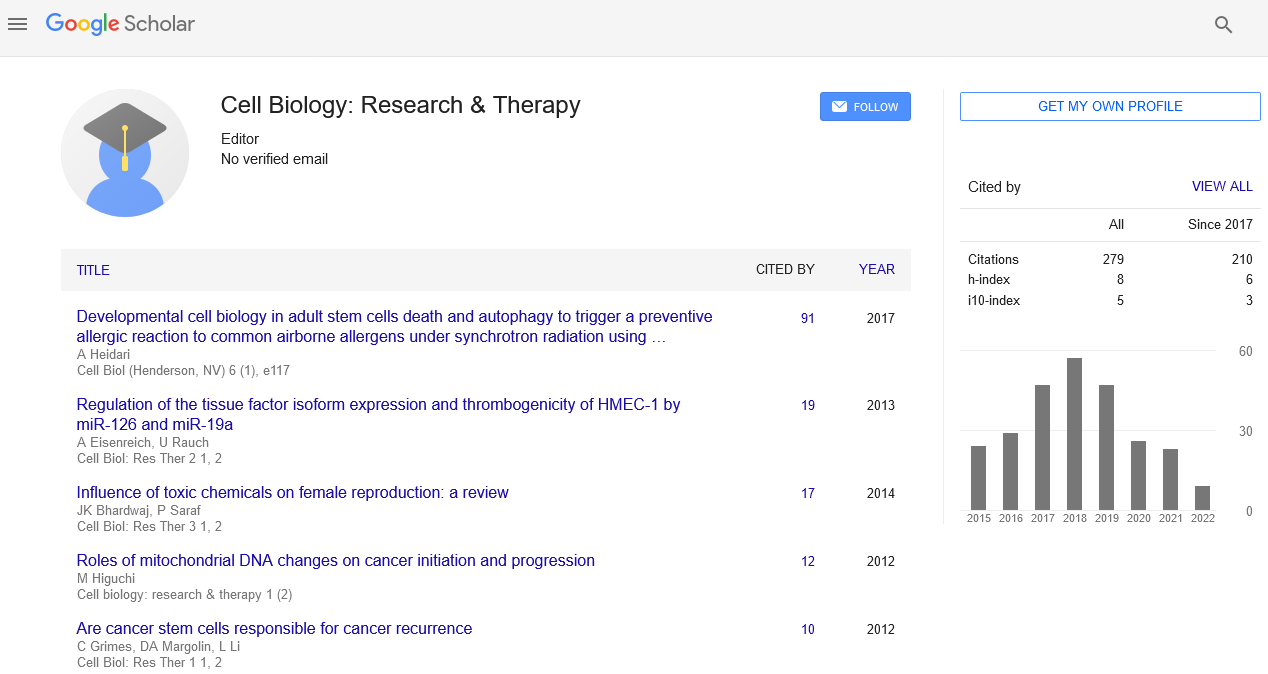Commentary, Cell Biol Vol: 12 Issue: 2
The Engineered Immunity of CAR-T Cell Therapy in Cancer Therapy
Xiong Zhou*
1Department of Immunology, Shanghai Tech University, Shanghai, China
*Corresponding Author: Xiong Zhou,
Department of Immunology, Shanghai Tech
University, Shanghai, China
E-mail: zohuxi@ong.cn
Received date: 22 May, 2023, Manuscript No. CBRT-23-105017;
Editor assigned date: 24 May, 2023, PreQC No. CBRT-23-105017 (PQ);
Reviewed date: 07 June, 2023, QC No. CBRT-23-105017;
Revised date: 14 June, 2023, Manuscript No. CBRT-23-105017 (R);
Published date: 21 June, 2023 DOI: 10.4172/2324-9293.1000177
Citation: Zhou X (2023) CThe Engineered Immunity of CAR-T Cell Therapy in Cancer Therapy. Cell Biol 12:2.
Description
CAR-T cell therapy has emerged as a groundbreaking treatment modality, revolutionizing the field of cancer therapy. By harnessing the power of the immune system, CAR-T cell therapy offers new hope for patients with previously untreatable or relapsed cancers. In this study one will learn the principles, development, successes, challenges, and future prospects of CAR-T cell therapy.
CAR-T cell therapy
CAR-T cell therapy involves genetically modifying a patient's own T cells to express Chimeric Antigen Receptors (CARs) on their surface. These CARs are designed to recognize and bind to specific antigens present on cancer cells. The modified CAR-T cells are then expanded in the laboratory and reinfused into the patient, where they target and eliminate cancer cells with precision.
Principles of CAR-T cell therapy
CAR-T cell therapy circumvents some of the limitations of traditional cancer treatments by directly leveraging the power of the immune system. The CARs on the surface of the engineered T cells enable them to recognize cancer cells independently of Major Histocompatibility Complex (MHC) molecules, which are usually involved in T cell activation. This mechanism allows CAR-T cells to recognize a wide range of cancer cells, including those with reduced MHC expression.
Successes in hematological malignancies
CAR-T cell therapy has achieved remarkable success in treating certain hematological malignancies, particularly acute lymphoblastic leukemia and certain types of non-Hodgkin lymphoma. Clinical trials have shown unprecedented response rates and even durable remissions in patients who have failed standard treatments. CAR-T cell therapies, such as tisagenlecleucel and axicabtagene ciloleucel, have gained regulatory approvals for specific indications.
Challenges in solid tumors
While CAR-T cell therapy has achieved significant success in hematological malignancies, its application in solid tumors faces several challenges. Solid tumors have complex microenvironments, immune evasion me chanisms, and heterogeneous antigen expression, making it difficult for CAR-T cells to peneterate and effectively eliminate cancer cells. Resea rchers are actively exploring strategies to enhance CAR-T cell therapy's e fficacy in solid tumors, including developing novel CAR designs, improving CAR-T cell persistence, and and overcoming immunosuppressive factors.
Managing side effects
CAR-T cell therapy can lead to significant side effects, notably cytokine release syndrome and neurotoxicity. CRS occurs due to the release of cytokines by activated CAR-T cells and can range from mild symptoms to severe and life-threatening conditions. Efforts are focused on improving the understanding, prediction, and management of these side effects through close monitoring and targeted therapies.
Advancements and future prospects
The field of CAR-T cell therapy is rapidly evolving, with ongoing advancements and exciting prospects. Researchers are exploring nextgeneration CAR designs, such as armored CARs and dual-targeting CARs, to enhance specificity, potency, and safety. Additionally, efforts are underway to optimize manufacturing processes and reduce costs, making CAR-T cell therapy more accessible to patients.
Combination therapies and beyond
Combination therapies, including the use of CAR-T cells in conjunction with other treatment modalities like immune checkpoint inhibitors, hold promise in enhancing response rates and overcoming resistance. Additionally, CAR-T cell therapy is being explored beyond cancer treatment, including viral infections and autoimmune diseases, expanding its potential therapeutic applications.
Towards personalized medicine
CAR-T cell therapy exemplifies the paradigm shift towards personalized medicine. Each patient's CAR-T cells are genetically engineered based on their specific cancer and immune profile. This individualized approach holds the potential to improve treatment outcomes and reduce adverse events by tailoring the therapy to the unique characteristics of each patient.
Conclusion
CAR-T cell therapy has ushered in a new era of cancer treatment, offering hope to patients facing limited options. By reprogramming a patient's own immune cells to specifically target cancer cells, CAR-T cell therapy has demonstrated remarkable success in hematological malignancies. However, challenges remain in expanding its effectiveness to solid tumors and managing associated side effects.
CAR-T cell therapy is a shining example of the transformative power of immunotherapy and personalized medicine. With continued dedication, collaboration, and innovation, CAR-T cell therapy has the potential to revolutionize cancer treatment, bringing us closer to a future where previously incurable cancers become manageable or even curable diseases.
 Spanish
Spanish  Chinese
Chinese  Russian
Russian  German
German  French
French  Japanese
Japanese  Portuguese
Portuguese  Hindi
Hindi 